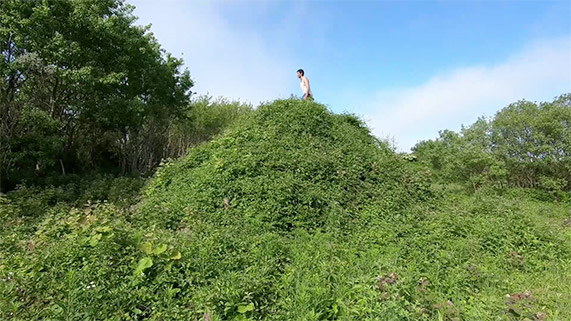GUIDO VAN DER WERVE

Guido Van Der Werve’s 2007 work Nummer Acht is one of the most captivating images I’ve seen. Filmed in the Golf of Bothnia, the artist walks steadily across frozen waters while a vast ship follows behind him. Although what we see might concern us, the title of the work reads “everything is going to be alright”. Then our focus draws away from the danger of the ship and the cold water beneath it to the calm nature of the artist. I wonder, what does the ship represent in my life? And am I walking so steadily?
Born in 1977 in the Netherlands, the artist grew up playing the piano and began composing his own music in 2007. He mentions Frédéric Chopin among his favorite composers. Van der Werve is also an avid runner and triathlete. He incorporates his interests into his work, explaining that art allows him to do all the things that he likes.
In an interview with Marc-Christoph Wagner, Van der Werve shares some interesting insight when he refers to boredom as a luxury, saying that his “good ideas came from being in this very bored state”. Later referencing a quote by Freud that “chance only strikes the attentive mind”. Valuing time and concentration when it comes to his creative process.

On April 28, 2007, Van Der Werve made “Nummer Negen, the day I didn’t turn with the world”. While the earth spun counterclockwise, the artist stood in the North Pole, slowly turning clockwise over the course of 24 hours. The idea that by standing in the right place, and turning in the opposite direction of the earths rotation, the artist would have stood in one place while everyone turned with the world. The work was described by Martin Herbert as partly being an analogy for “away-from-the-pack contrarianism”.
While researching the artist, I came across a work that caught me by surprise. At this point, I will be taking the video in a more personal direction by discussing a work of mine that is similar to Van der Werve’s. I debated whether to mention it or not because I don’t want to be self-centred and try to distract from his work. Although I can focus and share information only about the artist, I figured it would only be natural that I also mention how I relate to his work and what I think, feel or have learned along the way. Otherwise I feel like I’m analyzing an incomplete story. And I’m doing this because I want learn from and about others and hopefully further my own art practice.

Fast forward to 2015, Van der Werve made “Nummer zeventien, killing time from the deepest ocean to the highest mountain”. In one part of the work, the artist takes the equivalent steps it would take to get to the bottom of Mariana’s Trench using his bathtub. In the other part, the artist jumps on his bed the equivalent steps that it would take to climb Mount Everest. I suppose that was inspired by his past goal of wanting to climb Mount Everest and the metaphor “we all have our own Everest’s to climb”. While I knew some of Van Der Werve’s work, I was not aware of Nummer zeventien until I started doing research on him for this essay. In 2018, I made the film “Climbing A Mountain Out Of A Hill”, where I repeatedly climb a 12 foot hill until climbing the equivalent distance of a large mountain. The work was inspired by the idiom, “make mountains out of molehills”, which refers to the over reaction to minor issues that can happen during moments of great anxiety. It’s quite a coincidence that I and an artist who I think very highly of, both grew up playing the piano, both with an interest in chess, sports, and performance art; have both made a similar work. It makes me think that the way we think creatively is not so different from how we think reasonably. That when artists are faced with the same problem, or given the same subject or materials, that we can in many ways come up with the same answer.

I would never want to copy someone because that’s not fair to them and it’s also not fair to me because I have my own voice and I want to give myself a chance to think and act for myself. I would be lying if I said I didn’t feel sad about the situation because it was one of my favorite works and it came from a very personal place in my heart. When I made it I thought I did something special. But now that I’ve learned that the idea has been done before I feel like I didn’t contribute anything to art like I thought I did. As if while Van Der Werve chose not to turn with the world, I blindly followed.
Which leads me to question, what does it mean to be original? And how important is it? For now, I think that, if being creative is not so different to being reasonable, than just because you come to the same conclusion, it doesn’t make your answer wrong.